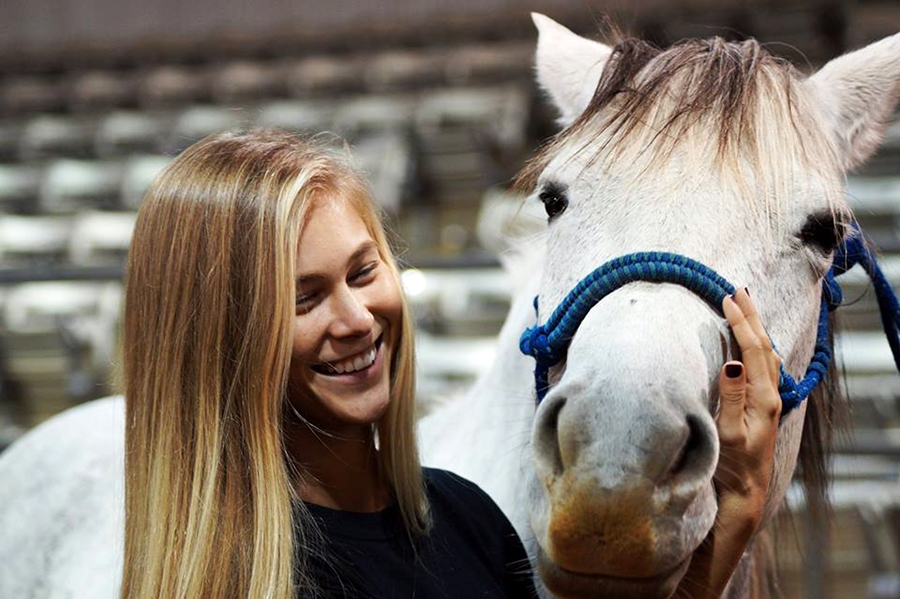
FAYETTEVILLE, Ark. – The D.E. King Equine Program in the University of Arkansas' Dale Bumpers College of Agricultural, Food and Life Sciences recently added an interdisciplinary course focusing in equine-assisted activities and therapies, and it's been a big hit with students across campus.
According to instructor Kathi Jogan, equine assisted activities and therapies is a growing field of study with documented evidence of the benefits of human and horse interactions. The course, housed in Bumpers College's Department of Animal Science, trains and educates students from animal science, psychology, social work, education, nursing, kinesiology and criminal justice, among others.
EAAT allows special-needs individuals to experience the benefit of either horseback riding or with horses and individuals on the ground. Riders work with therapists, speech language pathologists, mental health professionals, therapeutic or adaptive riding instructors, horse handlers and volunteers to receive continued treatment while riding.
"From the first day, the students understood that this class was one like they had never experienced before and would likely change the way they thought about themselves and others," said Jogan, who has managed Thoroughbred breeding and foaling farms, and was a licensed trainer and outrider.
"This class was easily the best part of my semester," public health major Kendra Wilichowski said. "Being able to witness the healing and the joy that comes to those who go through EAAT is absolutely incredible. I would highly recommend this class. It was the best experience and I will never forget it."
The Equine Assisted Activities and Therapies course (ANSC 410V) was offered during 2015 and 2016 fall semesters. Of 68 total students, 31 have been from Bumpers and 37 from other disciplines across campus. The 2016 class included majors from animal science, psychology, social work, communication disorders, public health and kinesiology.
"I think all students hoping to enter the field of social work should be exposed to the benefits of EAAT," social work major Jade Marano said. "It has been overpowering to watch the kids interact with the horses during private sessions and see first-hand the calming effects of the horses on these children."
Students study equine behavior and physiology, and the different clientele best served through EAAT. They explore different therapy types, evaluate horses and discuss characteristics making individual horses suited to therapy.
"This class was an eye-opener," psychology major Karsen Sims said. "I've been around horses my whole life, but I never really thought of something as intuitive as this. I will always encourage EAAT and hope to become a part of it."
The class, which meets at the Pauline Whitaker Animal Science Center, includes hands-on demonstrations with horses and dogs, guest lectures from EAAT and post-traumatic stress disorder specialists, psychiatrists and licensed social workers, an attorney specializing in running non-profit organizations, horse trainers, dog trainers who work with service dogs and a 15-hour service learning component.
"EAAT opens up a whole new world into another side of horses, linking equine activities to healing opportunities, both physical and unseen," animal science major Kayla Rhoads said. "It is remarkable the effect horses can have in a therapeutic setting."
Jogan received support from the American Quarter Horse Foundation's EAAT Educational Outreach grant to help create the class. Last year, facilities and instructors in the program earned national accreditation and certification, respectively, from the Certified Horsemanship Association. Jogan became the first instructor to earn Level 4 certification, earning the highest score in the 10-year history of the program.
About the Dale Bumpers College of Agricultural, Food and Life Sciences: Bumpers College provides life-changing opportunities to position and prepare graduates who will be leaders in the businesses associated with foods, family, the environment, agriculture, sustainability and human quality of life; and who will be first-choice candidates of employers looking for leaders, innovators, policy makers and entrepreneurs. The college is named for Dale Bumpers, former Arkansas governor and longtime U.S. senator who made the state prominent in national and international agriculture.
About the University of Arkansas: The University of Arkansas provides an internationally competitive education for undergraduate and graduate students in more than 200 academic programs. The university contributes new knowledge, economic development, basic and applied research, and creative activity while also providing service to academic and professional disciplines. The Carnegie Foundation classifies the University of Arkansas among only 2 percent of universities in America that have the highest level of research activity. U.S. News & World Report ranks the University of Arkansas among its top American public research universities. Founded in 1871, the University of Arkansas comprises 10 colleges and schools and maintains a low student-to-faculty ratio that promotes personal attention and close mentoring.
Topics
Contacts
Robby Edwards, director of communications
Dale Bumpers College of Agricultural, Food and Life Sciences
479-575-4625, robbye@uark.edu